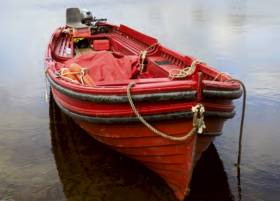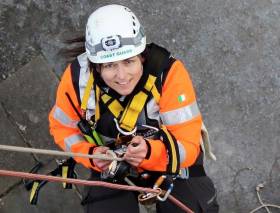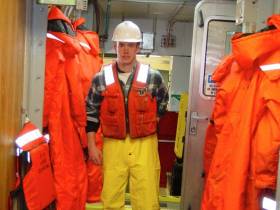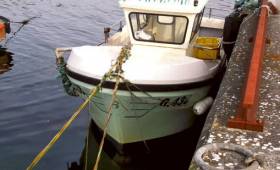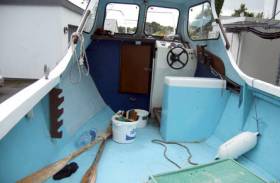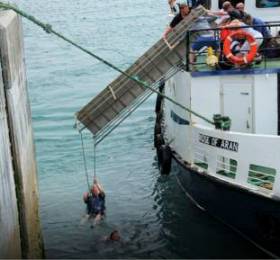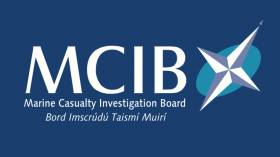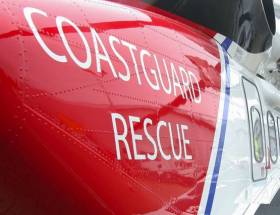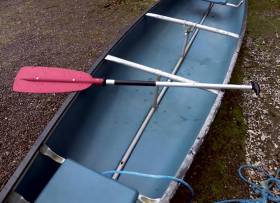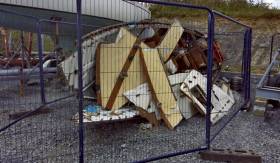Displaying items by tag: MCIB
Poor Practices Contributed To Lough Leane Ferry Incident Says MCIB Report
#MCIB - Marine investigators have highlighted a series of poor practices in their report into the flooding of a small passenger ferry on Lough Leane last September.
Twelve passengers and the boat’s master were tipped into the water when the PV Mary Ann of Dunloe, a traditional Irish open clinker, listed to port after being swamped amid heavy waves at Foilcoille Point, en route from Ross Castle to the Gap of Dunloe, on the morning of 1 September 2016.
All involved were rescued by three other vessels and safely retuned to Ross Castle in Killarney.
In its investigations, the Marine Casualty Investigation Board (MCIB) found that the master, who was operating without the requisite Passenger Vessel Commercial Endorsement, had set out in calm conditions but continued to motor the heavily laden boat in weather contrary to its P2 licence.
Rather than being flooded by a single ‘rogue wave’ as the master suggests, the available evidence points to “green seas” on the lake flooding the bilge beyond the capabilities of its pump, says the MCIB report.
“The combination of the prevailing lake conditions, the large amount of water already in the vessel, the speed of the vessel and the turning manoeuvre all contributed to the vessel becoming swamped.”
The passengers’ predicament continued during their rescue, it emerged, with the first vessel to reach them unable to deploy its lifebuoys as they were fastened too tightly.
The second vessel to assist also had difficulties, getting its propeller caught in a rope from and colliding with the casualty boat, holing its own hull. A third vessel, alerted by a passing waterbus, picked up all passengers.
But the MCIB also noted the absence of accurate weather information for Lough Leane, which is subject to very localised conditions but has not had an operational weather buoy for some time.
The full report from the MCIB is available to download below.
Investigation Ongoing Into Death Of Coastguard Volunteer Caitriona Lucas
#MCIB - An official investigation into the death of coastguard volunteer Caitriona Lucas remains ongoing, as the Marine Casualty Investigation Board (MCIB) confirms.
Lucas, a volunteer for the Irish Coast Guard’s Doolin unit, died on 12 September 2016 during a search operation for a missing person in Kilkee, when the RIB in which she and two other volunteers were travelling capsized in a heavy swell.
The MCIB’s interim report outlines the details of the day in question. Investigators’ analysis, conclusions and recommendations will be reserved for the final report.
#WaterSafety - The latest Marine Notice from the Department of Transport, Tourism and Sport (DTTAS) advises everyone on or near the water of the correct use of lifejackets or personal flotation devices (PFDs).
Lifejackets should always be warn over all clothing, so that there is sufficient space for the device to inflate, the wearer’s breathing is not restricted, and there is easy access to activate a manual personal locator beacon.
Marine Notice No 34 of 2017 comes after the recent MCIB report into the death of lobsterman Patsy Kelly in Galway Bay last September, as previously reported on Afloat.ie.
Kelly, who went overboard from his vessel while retrieving a string of lobster pots, was found to be wearing a PFD but underneath an oilskin smock, significantly limiting his ability to signal for help.
The report also found that Kelly’s lifejacket was five months overdue for service of its active components, such as its gas canister and battery-operated light.
MCIB Calls For Update On Best Practice For Lifejackets
#MCIB - Marine investigators have recommended that fishermen be reminded of best practice for wearing PFDs while on the water.
That’s the main recommendation from the Marine Casualty Investigation Board’s (MCIB) report on an incident in Galway Bay last September that took the life of Patsy Kelly.
As previously reported on Afloat.ie, the body of the local lobsterman was recovered off Salthill hours after his boat was found empty at Tawin Island on 7 September 2016.
Kelly had set out earlier that morning at 6am from Ballinacourty on his boat Loch Corrib II to retrieve a string of lobster pots.
The boat was noticed stationary in the water around lunchtime by another vessel fishing in the area, which approached to find it unmanned with the engine running.
It’s believed that Kelly suffered some sort of collapse while attempting to untangle his string of pots, which caused him to enter the water.
Kelly’s body was recovered more than four nautical miles from his vessel after 6.30pm that evening.
He was found to be wearing his PFD but underneath an oilskin smock, which would have meant no access to the switch for the lifejacket’s locator beacon.
The MCIB report also found that the PFD, while it inflated, was five months overdue for a service.
The full report into the Loch Corrib II incident is available to download below.
#WaterSafety - The dangers of boating without proper safety equipment have been raised by a report into the death of an angler who went overboard from his vessel off West Cork last summer.
The body of Michael O’Brien was recovered on the morning of 15 August 2016, after he was reported missing the previous evening when he failed to return to Schull from a solo fishing trip.
The Marine Casualty Investigation Board (MCIB) report into the incident found that O’Brien, who regularly went angling around Long Island Bay in the summer months, was not wearing a PFD and had no emergency beacon or VHF radio, with only a mobile phone for communication.
It’s unknown how the 69-year-old came to enter the water, but his reduced mobility due to a hip operation and the fact that his crutches were found stowed suggests he used the boat’s bulwarks for support, which would have put his centre of gravity over the edge of the vessel.
The full MCIB report can be downloaded below.
#MCIB - Lack of safety management contributed to an incident in which two people fell into the water while disembarking from a ferry at Inis Oírr Pier last summer.
That’s according to the Marine Casualty Investigation Board (MCIB) report on the event that involved the passenger ferry Rose of Aran on 6 June 2016.
Two passengers disembarking the ferry that morning, a man and a woman, were treated for shock after entering the water when the gangway slipped off the quayside.
It emerged that the stern line holding the Rose of Aran at its berth, fastened by a bystander and not checked by crew at the bow lines, had come loose at some point after passengers began disembarking.
The stern line is not immediately visible from the boat’s wheelhouse — a situation made worse by crowds on the pier at the time blocking the already obscured view.
Upon noticing that the boat was drifting, the master attempted to move it back into position, but it was pushed away by wash from the engines of the boat moored astern, causing the gangway to slip.
In its analysis, the MCIB determined that the Liscannor Ferry Company, which operates the Rose of Arran, operated with a safety management system, or SMS, that “lacked specific risk assessments and standard operating procedures for berthing at the various piers and harbours used” by its vessels.
The SMS also lacked a ‘Man Overboard’ situation among its emergency drills. As a result, the crew “were not trained or prepared for recovery procedures within the confines of the harbour.
“The recovery of the casualties would not have occurred without people on the shore entering the water and assisting them to shore,” it added.
But the MCIB also took Galway County Council to task for the lack of bye-laws, or a harbour master, to govern operations at Inis Oírr Pier, which allows vessels to berth with engines running and regularly experiences overcrowding that “hinders the safe berthing of ferries”.
The full MCIB report can be downloaded below.
Interim Report Into Prawn Trawler Fatality Off Slea Head
#MCIB - The Marine Casualty Investigation Board (MCIB) is continuing its inquiry into the death of a fisherman who went overboard from a prawn fishing trawler off Slea Head a year ago.
The interim report released today (Friday 23 June) details the incident on 30 June 2016, in which a crew member on the FV Cu Na Mara went overboard during the process of reattaching the boat’s two nets from their drums to the middle towing winch at its stern.
The skipper and fellow crew responded immediately to assist the casualty, who was wearing a personal flotation device (PFD) that inflated on contact with the water.
Though the casualty was quickly recovered from the sea and administered first aid by his crew mates, he did not survive.
The MCIB’s full report into the FV Cu Na Mara incident is forthcoming.
Marine Notice: Hi-Line Protocols For Helicopter SAR Assistance
#MarineNotice - The latest Marine Notice from the Department of Transport, Tourism and Sport (DTTAS) details the proper hi-line protocols when receiving assistance from a search and rescue helicopter.
The notice follows the findings of last year’s MCIB report into the sinking of the fishing trawler Iúda Naofa off Scotland in January 2015.
As previously reported on Afloat.ie, it was determined that the crew of the trawler lacked knowhow regarding the use of hi-line, which meant they were unable to release an emergency pump dropped to the vessel on a standard clasp from a UK coastguard helicopter.
Full details are included of Marine Notice No 3 of 2017, a PDF of which is available to read or download HERE.
Basic Safety Measures Not Taken Ahead Of Kenmare Canoe Drowning - MCIB
#MCIB - Basic water safety precautions were not taken before a canoe capsize incident that led to the drowning of a man off Kenmare almost a year ago.
That’s the main conclusion of the official report into the tragedy in Kenmare Bay in which local man Bill Topham died, as previously reported on Afloat.ie.
Topham had been canoeing to islands in Kenmare Bay with a friend for a duck shoot when their two-man vessel overturned in high winds on the afternoon of 31 January 2016.
The Marine Casualty Investigation Board report identified that neither passenger on the canoe was wearing a personal flotation device.
It also concluded that their decision to undertake their trip amid adverse weather conditions with a fully laden canoe, including two boisterous dogs, greatly increased the “inevitable element of natural risk” involved.
The full MCIB report into the incident is available to download below.
Loose Gas Hose Likely Culprit In ‘Pegasus’ Explosion
#MCIB - A loose gas hose is the most likely cause of an explosion that sank a restored classic yacht in Galway Bay earlier this year, according to the official investigation into the incident.
As previously reported on Afloat.ie, an attempt to boil a kettle almost ended in tragedy with the blast on board the 26ft sloop Pegasus on Saturday 9 April, just months after her first full season following relaunch.
Both sailors on board — the owner and a colleague — survived the incident, with the former treated for burns to his hands, though the boat itself was destroyed.
Investigators from the Marine Casualty Investigation Board (MCIB) determined that the explosion was most likely caused by a build-up of gas in the bilges of the boat over a number of minutes after the cockpit valve was turned on, which ignited when the owner struck a match to light the newly installed stove.
While the MCIB report was not able to determine the exact layout of the gas cylinder, regulator and hose connected to the cooker prior to the incident, it was found that the hose itself was too large for its connections despite being clamped, and had likely loosened some time before, allowing gas to leak.
The investigation also noted that the vessel had no gas alarm, which would have given ample warning of a leak to those on board.
The full MCIB report is available to download below.



























